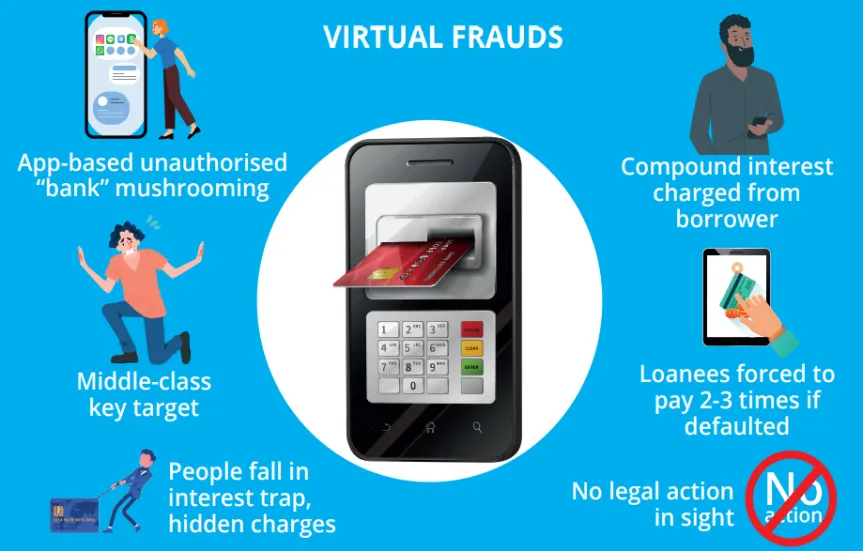Home ›› 18 Jul 2021 ›› Front

A number of illegal mobile application-based ‘virtual banks’ are preying on the vulnerable and cash-strapped desperate people, offering them shady financial services in exchange for exorbitant fees during the coronavirus crisis.
These so-called banks have no legal framework and are operating without the approval of Bangladesh Bank.
They offer instant loans, remittance, p2p payments, fund transfers, bill payments, and even issue prepaid and debit cards.
People from the lower middle-class tier and the young, who are financially vulnerable, constitute the majority of these ‘virtual banks’ clients. But these lenders are imposing various hidden charges and high interest on their clients.
All that glitters
The app-based lenders attract clients with tacky advertisements and graphical presentations on YouTube and other social media platforms.
‘RapidCash’, one such app-based loan provider, offers instant loan of up to Tk10,000 without any collateral and guarantor unlike conventional banks.
For an emergency loan, one has to register with the lender through the mobile app by submitting his or her personal information, work details, emergency contact and a photo of the national identity card.
If the lender, who remains out of sight throughout the entire process, deems the applicant eligible, the loan is promptly provided.
According to RapidCash, it charges service fee for data analysis and application processing and also collects microfinance interest fees “as per government guidelines”.
Apart from RapidCash, a number of mobile app-based lenders, including Cashman, ShopUpeLoan, mCash and CashCash, are offering emergency loans of up to Tk30,000 without any collateral.
None of these lenders has obtained licence from the central bank for operation.
Cheated throughout
The Business Post met half a dozen young men who took loans from these lenders either through the apps or their Facebook pages.
Rabiul Islam, a college student, applied for an instant loan of Tk 5,000 from RapidCash to meet his urgent needs. He was told that he was eligible for a loan of Tk 2,000 but will have to pay back the amount and interest within seven days.
Rabiul agreed to the conditions but was provided Tk1,685 instead of Tk2,000. The lender deducted Tk315 asfee for application processing, data analysis fee and VAT.
But he has to pay Tk2,005 (including Tk 5 in interest) within seven days. Rabiulrued getting into what he called a ‘debt trap’ and urged the law enforcement to take legal actions against these unauthorised lenders.
Another debtor Faisal Rahman, a small entrepreneur, took loan from Cashman.
“I had to pay three times the loan amount as I fell behind the repayment schedule,” he said.
These fraudsters charge compound interest for delayed payment, Faisal said, adding that they are cheating the needy out of their fortune.
Putting up a facade
Another mobile app-based virtual entity, pahela.money, claims to be an “online banking platform” but has neither central bank authorisation nor any physical branch.
It launched operation in Bangladesh in March this year offering banking services such as remittance, p2p payments, fund transfers, bill payments, and even issuing prepaid and debit cards.
Its founder and Managing Director Reyad Rahman acknowledged that his financial service platform has no central bank licence.
“We have partnered with regulated banks across the borders to offer banking services,” he said, adding that his bank provides savings accounts, virtual cards, MasterCards and debit cards through the partnership.
“We have no central bank licence but we are operating under the Bangladesh Bank’s Regulatory Fintech Facilitation Office (RFFO),” he said.
Other app-based lenders could not be reached for comments despite repeated attempts.
No virtual bank yet
Virtual banks’ popularity soared in the developed countries amid the global Covid-19 pandemic but it is yet to take off in Bangladesh.
Established in October 2019, RFFO facilitates implementation of innovative FinTech ideas by providing related regulatory assistance. Interested FinTech participants may contact RFFO for any query or support.
Several applications have been submitted to the central bank for permission to operate the banks’ virtual entity, with Bank Asia being one of them.
Bangladesh Bank Executive Director Md Serajul Islam said the central bank is yet to award licence to any virtual bank or financial service provider.
Act before it’s too late
When asked about the app-based lenders, Serajul said it was up to the law enforcers to take action but the law enforcers said taking action depends on the central bank.
“The mobile app-based lenders are conducting fraudulent banking. They are illegal and everyone should be careful about them,” Serajul warned.
Additional Deputy Inspector General of CID Cyber Police Md Kamrul Ahsan said that they are monitoring the app-based financial entities. “We are monitoring them but no initiative has been taken till now as we have not received any complaint against the virtual lenders,” he told The Business Post.
“The Bangladesh Bank monitors the financial sector. If the central bank asks us to take legal action, we will go for it.”
Former Bangladesh Bank governor Salehuddin Ahmed said the central bank can request the ICT ministry to take action against the app-based unauthorised lenders.
The ICT ministry can find out who develop these apps and who control it, he said.
“The Bangladesh Bank should not waste time and make a move now instead of waiting for some scam to happen. It should be proactive and take immediate action against the virtual lenders who are victimising the people,” he said.